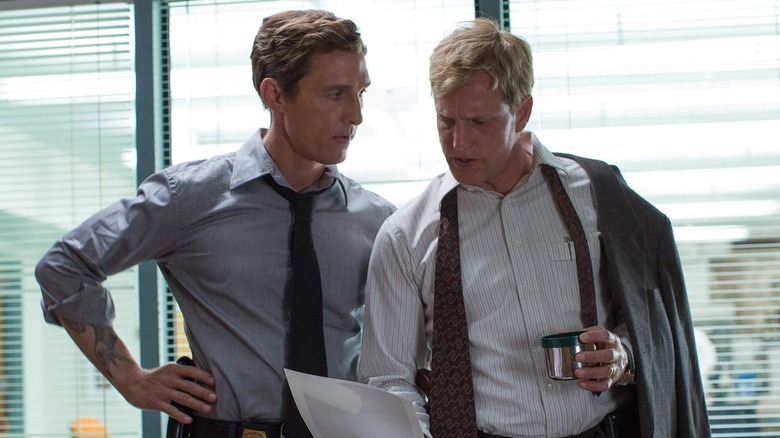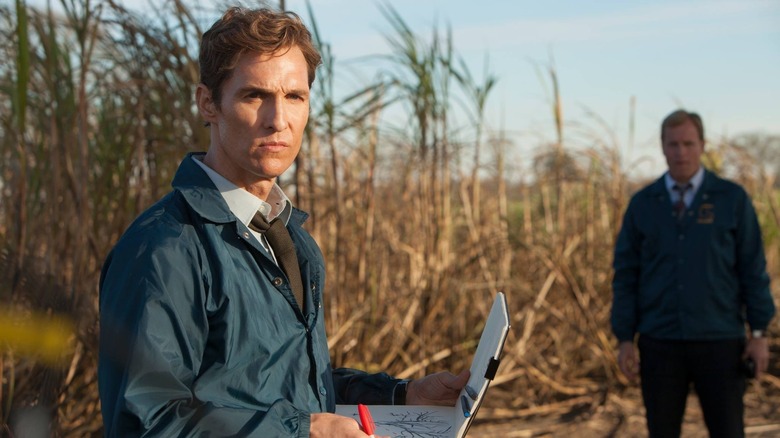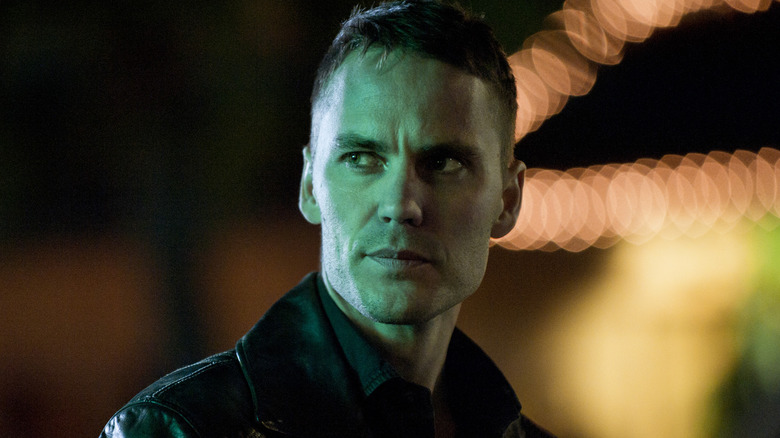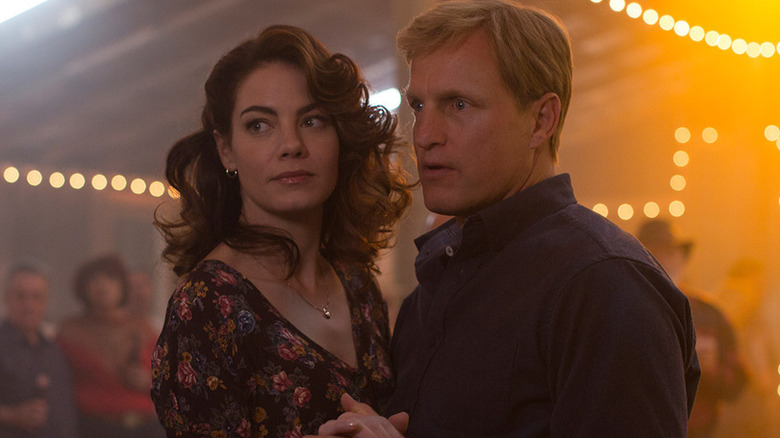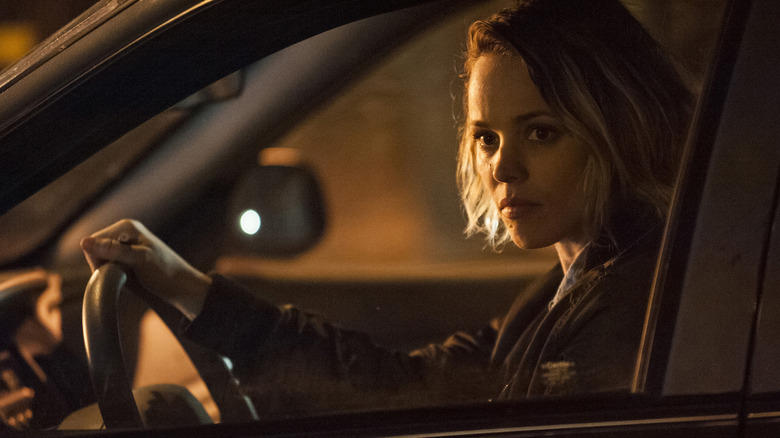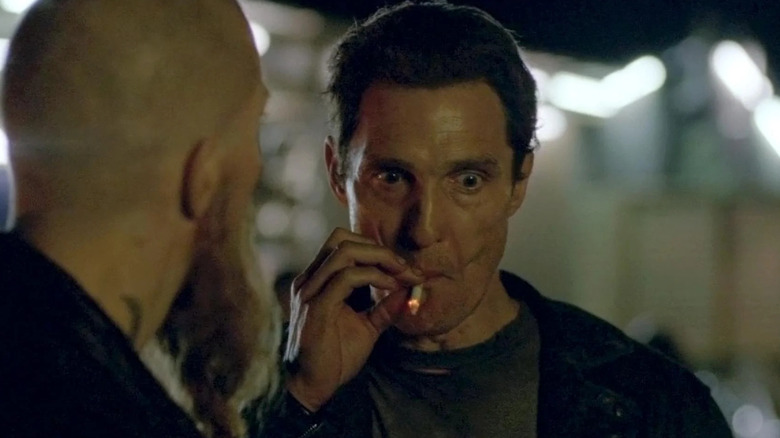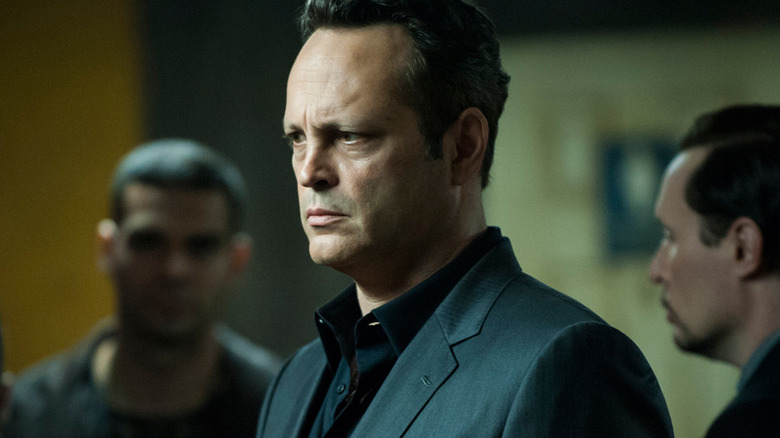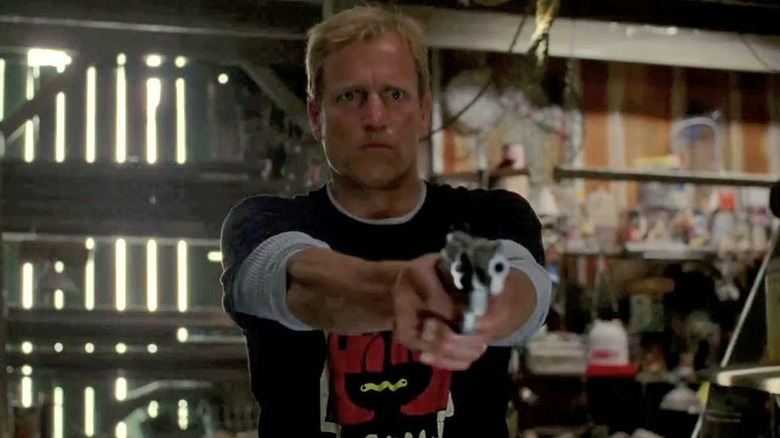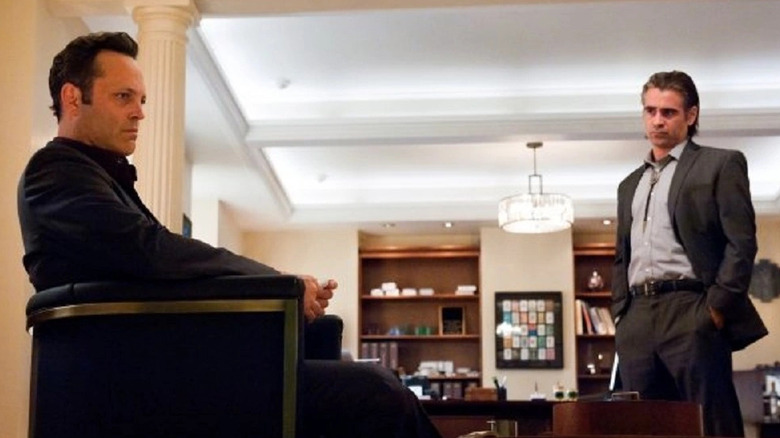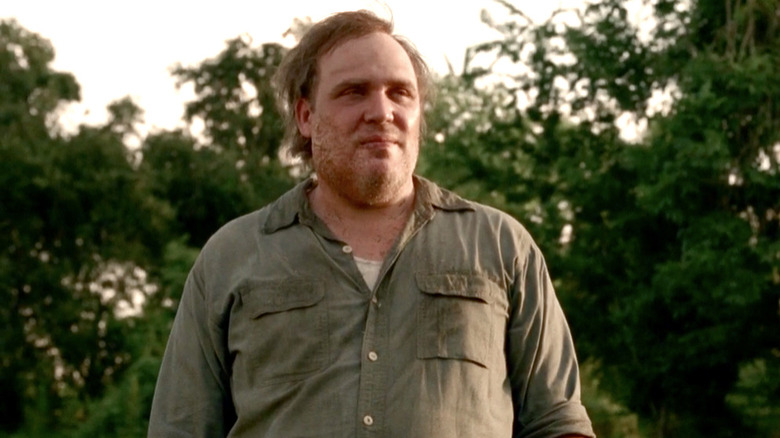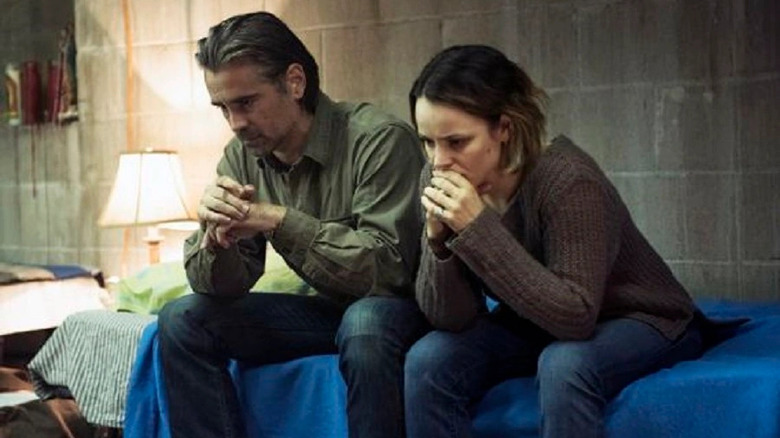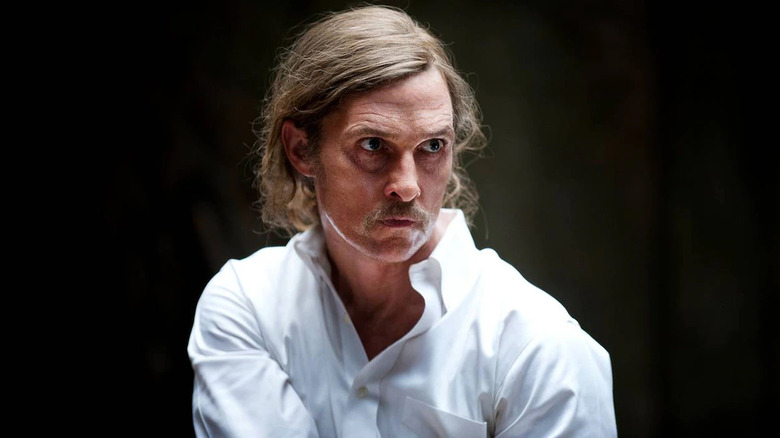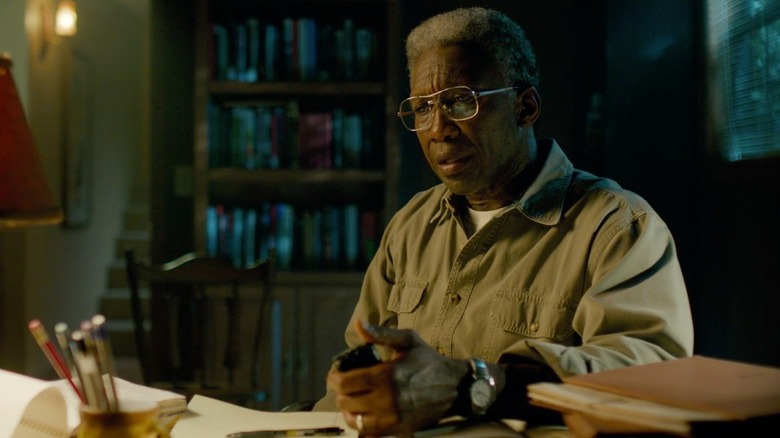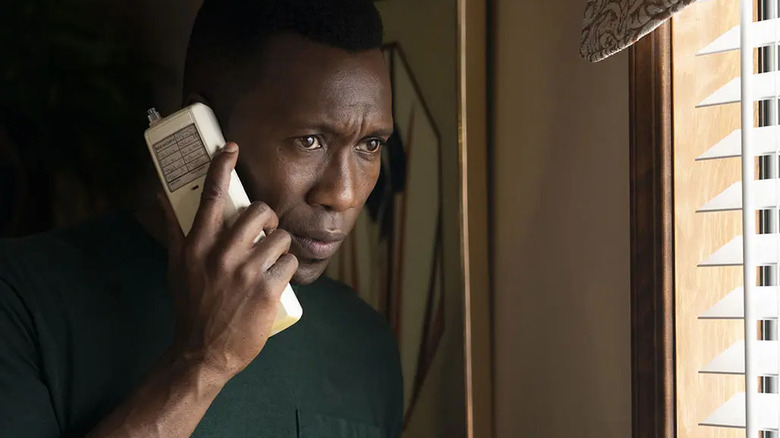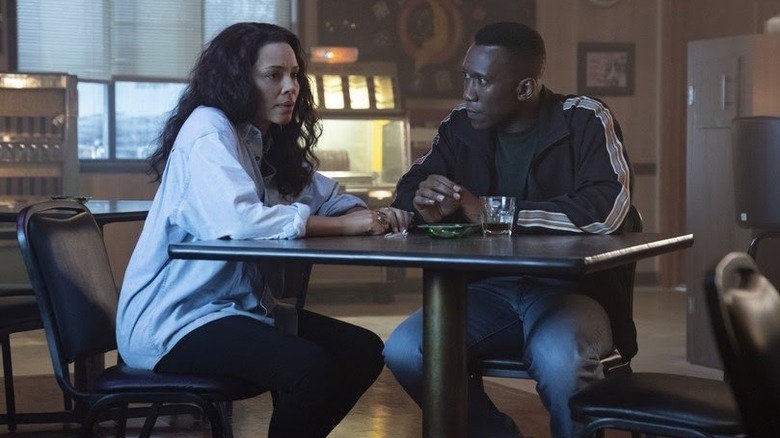The 7 Best And 7 Worst True Detective Episodes
HBO is responsible for some of the most influential television shows of all time. The current Golden Age of Television that we are living in now began with "The Sopranos" in 1999. However, "True Detective" was something completely different. The eight-episode detective series premiered in 2014, and changed television forever. There was a longstanding notion that television was somehow a lesser medium when compared to film. "True Detective" proved that to be incorrect pretty quickly. The first season, directed by Emmy winner Cary Joji Fukunaga, starred two of the biggest movie stars in the world: Matthew McConaughey and Woody Harrelson. It also helped create the auteur-driven television show that we see so frequently today.
It's safe to say that the second season of "True Detective" did not live up to the high expectations that fans of the first season had. Contrary to what detractors may think, "True Detective" Season 2 is not bad; it's only in comparison to the first season that it falls short. It's worth watching for the incredible performances by Colin Farrell, Rachel McAdams, Taylor Kitsch, Kelly Reilly, and Vince Vaughn alone. The third season also starred Mahershala Ali and told a story that becomes connected to the narrative arc of the first season. If you're planning to binge-watch the anthology series ahead of Season 4, titled "True Detective: Night Country" and starring Jodie Foster and Kali Reis, here are the best and worst episodes so far.
Best: The Long Bright Dark (Season 1, Episode 1)
"True Detective" revealed early on that it was working on a level of craftsmanship that few television shows had ever reached before. In no way did it feel like just another procedural crime detective series. The pilot episode, "The Long Bright Dark" unfolded in a nonlinear way and featured stunning visuals, which made it feel like a film. Forget "NCIS" or "Law & Order." This was a serial killer story on the level of "Se7en" or "Silence of the Lambs."
The episode introduces the Louisiana State Police homicide detectives Rust Cohle (Matthew McConaughey) and Marty Hart (Woody Harrelson). The two detectives were once allies, but they have grown to despise each other after working on a controversial case. "The Long Bright Dark" shows Rust and Marty in two intersecting timelines. In 1995, the pair begin their investigation, and we also see Rust being interviewed about his involvement in the case in 2012. This created a sense of mystery as the viewers pondered various questions: Why do these characters hate each other? Why is this case being brought up again? The episode establishes that neither character is entirely trustworthy. They claimed to have solved the murder of Dora Lange in 1995, but in 2012, the authorities think that her killer is still at large.
Worst: The Western Book of the Dead (Season 2, Episode 1)
It would be an understatement to say that the first episode of the second season falls short of "The Long Bright Dark." "The Long Bright Dark" provoked the viewers to ask questions about the direction of the plot, the background of the characters, and the identity of the enigmatic killer. It was an engaging episode that hooked viewers in. Audiences certainly had a lot of things to question at the end of "The Western Book of the Dead," but this time they were asking themselves what was going on, and why they should even care.
"The Western Book of the Dead" is simply overstuffed with characters. Over the course of one hour, the episode introduces the California Highway Patrol officer Paul Woodrugh (Taylor Kitsch), the criminal mastermind Frank Semyon (Vince Vaughn), the Vinci Police Department Detective Raymond Velcoro (Colin Farrell), and Ventura County Sheriff's Office CID Ani Bezzerides (Rachel McAdams). It's not entirely clear how they are all connected; Woodrugh, Bezzerides, and Velcoro don't even team up until the very end. "The Long Bright Dark" gave viewers just enough of the mystery to chew on, but the plot of Season 2 already seems convoluted by the end of "The Western Book of the Dead." The corpse of the Vinci City Manager Ben Caspere (Bo McCann) is discovered, provoking an investigation into his disappearance. There's so much attention paid to the procedural terminology and city infrastructure that the story does not feel engaging.
Best: The Locked Room (Season 1, Episode 3)
The first season really starts heating up in the third episode, "The Locked Room." It reveals important insights about Rust and Marty's personalities, and provides more details on the nature of the case. It is disturbing to see how fatalistic Rust has become in 2012. "If the common good's got to make up fairy tales, then it's not good for anybody," he says. "The Locked Room" confirmed that the series would only continue to get darker and more cynical. However, Matthew McConaughey is so magnetic in the role that it is hard not to be engaged in his long monologues. The dialogue-centric scenes in 2012 are just as exciting as the investigation scenes in 1995.
Generally, television shows feel the need to avoid extensive expositional scenes, but "The Locked Room" manages to give viewers insight on the story as Rust and Marty interview local residents. They have to prevent the case from being reassigned to a different task force. There's also a religious subtext to the entire first season that becomes more apparent in "The Locked Room." Rust and Marty speak with pastor Joel Theriot (Shea Whigham), who reveals to them that Lange occasionally attended worship services before her death. He shares details about the killer, who is identified as a tall, scarred man. It's implied that whoever this mysterious assailant is, they are evil to an otherworldly degree.
Worst: Night Finds You (Season 2, Episode 2)
After the baffling pilot, the second episode of "True Detective" Season 2 didn't clear anything up. One of the reasons that the first season was so great is that the split timelines told distinct stories, but referred to similar events. By comparison, Season 2's multiple subplots feel like they are almost entirely disconnected. "Night Finds You" jumps all over the place without a clear narrative direction. While Rust and Marty are both unlikeable characters because of their dubious actions, the viewers were interested in learning more about them. How did these two relatively competent detectives become disgruntled, washed-up older men?
The characters in Season 2 feel like they are trying to evoke the viewers' sympathies. Velcoro is saddled with a storyline involving his inability to connect with his son, Chad (Trevor Larcom). In "Night Finds You," Velcoro gets into a heated argument with his ex-wife, Gena Brune (Abigail Spencer). This subplot is uncomfortable to watch and feels like melodrama. The episode later ends with a cliffhanger that holds no emotional weight. Velcoro receives a tip from Semyon, which leads him to one of the properties that Caspere owned. At the end of the episode, Velcoro is shot, but it was obvious that the show wasn't going to kill off one of its main stars this early on.
Best: Who Goes There? (Season 1, Episode 4)
"Who Goes There?" is the episode that elevated season one of "True Detective" to legendary status. The episode is best known for a six-minute-long take, where Rust tries to break into a trailer to commit a robbery. This incites chaos among the trailer's inhabitants, forcing Rust to take his contact Ginger (Joseph Sikora) captive. The entire scene was captured in one take. While these types of tracking shots were common in auteur-driven films, such as the iconic restaurant scene in Martin Scorsese's "Goodfellas," seeing one on television was virtually unheard of.
The sequence would be impressive as a standalone accomplishment, but it's even more extraordinary how well it's incorporated into the rest of the episode's narrative arc. Cary Joji Fukunaga establishes the emotional stakes of the entire case in the opening scene, where the two detectives interview Dora's husband, Charlie Lang (Brad Carter). Although Charlie is distraught and openly shares his grief, the detectives don't show him very much sympathy. Marty reaches his lowest point in the series in "Who Goes There?" After an argument with his mistress, Lisa (Alexandra Daddario), Marty's infidelities are uncovered by his wife, Maggie (Michelle Monaghan). Maggie is furious and leaves their home with the couple's children. This puts even more pressure on Marty. He's already in over his head with the case, and he doesn't entirely trust Rust. A family conflict is the last thing that he wanted to deal with.
Worst: Maybe Tomorrow (Season 2, Episode 3)
The disappointing trajectory of the second season of "True Detective" continued with the third episode, "Maybe Tomorrow." The opening scenes of the episode are saddled with wrapping up the cheap cliffhanger from the previous week's episode. As most viewers suspected, Velcoro survives the shoot-out and wakes up gasping for air. He discovers that a computer file containing details about Caspere's marital infidelities has gone missing. This feels too much like a coincidence. In the first season, Rust and Marty use their intelligence to put together details of the case. In "Maybe Tomorrow," it seems like Velcoro keeps accidentally figuring things out.
What's unfortunate about "Maybe Tomorrow" is that it was helmed by a truly skilled filmmaker, but it didn't fit into the format of a serialized mystery series. "Maybe Tomorrow" was directed by Danish filmmaker Janus Metz Pedersen. Following his work on "True Detective," Pedersen helmed the excellent sports biopic "Borg vs. McEnroe" and the old-fashioned political thriller "All The Old Knives." Clearly, he's a director who works best telling gritty, realistic stories. However, "True Detective" has always been so unique because there's just a hint of surrealism, due to the religious undertones of the crimes. Compared to the more experimental direction of the first season, Pedersen's stylistic impulses felt a little bit bland.
Best: The Secret Fate Of All Life (Season 1, Episode 5)
It was going to be hard for "True Detective" Season 1 to top itself after the incredible conclusion of "Who Goes There?" However, the fifth episode, "The Secret Fate Of All Life," finally provides some answers about the case, and introduces a third timeline. It packs a lot of important information into one episode, but "The Secret Fate Of All Life" never feels bloated or dull. It was the right time to start peeling away some of the most traumatic incidents from the detectives' first investigation.
A key sequence in 1995 shows why Rust and Marty have been so cagey about discussing the case. Ginger leads the pair to the meth cooker DeWall Ledoux (Ólafur Darri Ólafsson). They discover two kidnapped children, who have clearly been abused. DeWall accidentally perishes after attempting to escape the scene of the crime. Facing no other alternative, Rust and Marty decide to falsify evidence, which will make it look like there was a more straightforward firefight. They uncomfortably accept the awards and recognition that they receive when the police department celebrates their accomplishments. The third timeline in 2002 is introduced, which reveals that Marty and Maggie have recovered from their previous argument. However, Rust is just as troubled as ever as he's still putting together the pieces of the case.
Worst: Other Lives (Season 2, Episode 5)
Season 2 managed to rebound from its previous failures with its fourth episode, "Down Will Come." The fourth episode was much more exciting because Velcoro, Bezzerides, and Woodrugh finally started working together as a team. The audience had a reason to empathize with them as a unit. Unfortunately, the fifth episode was another slog to get through. A confusing time jump makes the raw emotional climax of "Down Will Come" feel less impactful.
"Down Will Come" ended with an intense shoot-out sequence, but "Other Lives" moves the events of the series two months later. Within these two months, the official police investigation into Caspere's death has ended. After the slow pace of the first few episodes, it felt incredibly odd that so many major events occur off-screen. It also would have been interesting to see how Velcoro, Bezzerides, and Woodrugh reacted to the aftermath of the firefight. The audience doesn't get to see the characters processing the violent events that they witnessed and survived.
Best: After You've Gone (Season 1, Episode 7)
"After You've Gone" does everything that a penultimate episode of a television series should do. It shows the lead characters when they are at their most vulnerable, and sets up a lot of questions for the last episode to answer. "True Detective" Season 1 is incredibly economical with its time. It never feels like there are any filler episodes. "After You've Gone" has to have some expositional moments, but they don't feel hastily inserted into the story at all.
Rust and Marty are struggling to forgive each other in 2012. While neither man can claim that they truly care about one another, they become more determined to find the real killer than ever before. Rust shows Marty video evidence, which proves that a cult on the coast of Louisiana has kidnapped and tortured dozens of women and children. Marty is absolutely horrified. It's one of Harrelson's finest acting moments in the series. Marty has seen his fair share of disturbing cases, but for once, he sees something that truly shakes him to his core.
Worst: Omega Station (Season 2, Episode 8)
It will be interesting to see how "True Detective" Season 2 is reappraised after the show has aired additional seasons. Clearly, many mistakes were made along the way, but the second season certainly did its best to differentiate itself. Unfortunately, all of the failures of the season coalesced into a disappointing finale. At nearly 90 minutes, "Omega Station" is essentially a feature-length film. There's certainly a lot going on, but at the same time, it feels like the characters are almost secondary to the convoluted plot.
If there is one character from Season 2 that emerges with some dignity intact, it's Bezzerides. She manages to put together a new crew, and in all truthfulness, her next adventures feel more exciting than anything that actually happened in the second season. There's also an incredibly odd, borderline surrealist sequence at the very end featuring Semyon. He has a secret meeting with a Mexican drug cartel in the middle of the desert. The entire moment feels like it was lifted out of an arthouse film. This would have been interesting if the whole season had adhered to this tone, but on its own, the scene sticks out like a sore thumb.
Best: Form and Void (Season 1, Episode 8)
"Form and Void" is a perfect season finale, and is easily the most intense episode in the show's entire history. Rust and Marty identify Errol Childress (Glenn Fleshler) as the serial killer known as "The Yellow King." They pursue him through the secluded wilderness in a relentless chase. Fleshler has not received enough credit for how brilliant his performance was. Cruel, yet grounded in reality, he is one of the most captivating screen villains in recent memory.
It's the writing that makes "Form and Void" a satisfying end to this journey. "True Detective" has generally shied away from crowd-pleasing moments, but the scene where Marty's family visits him in the hospital is genuinely heartwarming. In the final moments, Rust and Marty reflect on what they have learned from their experiences together. They discuss a metaphorical battle between good and evil that is destined to continue forever.
Worst: The Big Never (Season 3, Episode 3)
The third season of "True Detective" is a bit of a mixed bag. It's much more focused and coherent compared to Season 2, but it lacks the cinematic quality of the first season. The series really rests on an incredible performance by Mahershala Ali. Ali stars as the Vietnam War veteran Wayne Hays, who now serves as a detective in the Arkansas State Police Department. Hays and his partner, Roland West (Stephen Dorff), are assigned a case to find two missing children in 1980.
The first two episodes do a great job explaining the background of the case and giving the audience a reason to care about Hays. Unfortunately, the third episode begins to get confusing with its multiple timelines. Hays has dyslexia and dementia, and struggles to remember everything that he has experienced. As a result, the episode flashes to different points in his memory.
Best: The Final Country (Season 3, Episode 7)
"True Detective" Season 3 finally delivered an episode worthy of the first season with its penultimate installment. "The Final Country" is an electrifying hour of television. The investigation into Tom Purcell (Scoot McNairy) in 1990 is seemingly closed after his body is discovered. However, Hays still has some questions about the case and refuses to believe that it could be wrapped up so quickly. These events perfectly lead to his reflections in 2015.
One of the best elements of the third season is the racial themes that the show has tackled. There is tension between Hays and West that bubbles to the surface in "The Final Country." Hays is working to solve a case within a Black community, and West is an outsider; it's interesting to see how they both proceed with their investigation. Mahershala Ali does a fantastic job at bringing dignity to the character.
Worst: Now Am Found (Season 3, Episode 8)
Despite the stellar penultimate episode, the season finale of the third season of "True Detective" was a bit of a disappointment. Similar to the Season 2 finale, "Now Am Found" is nearly feature-film length with its 75-minute runtime. Unlike the second season, Season 3 references the larger "True Detective" universe, and mentions events from the first season. Unfortunately, "Now Am Found" feels too much like a retread to stand on its own.
The main issue is that Hays and West's relationship is too similar to Rust and Marty's. Both pairs of detectives are drawn together by a case early within their careers and reunite as older men to solve it. The final conversation between Hays and West is far less emotionally satisfying than the closing moments of "Form and Void." It was a letdown, especially since the season had worked so hard to distinguish itself.
